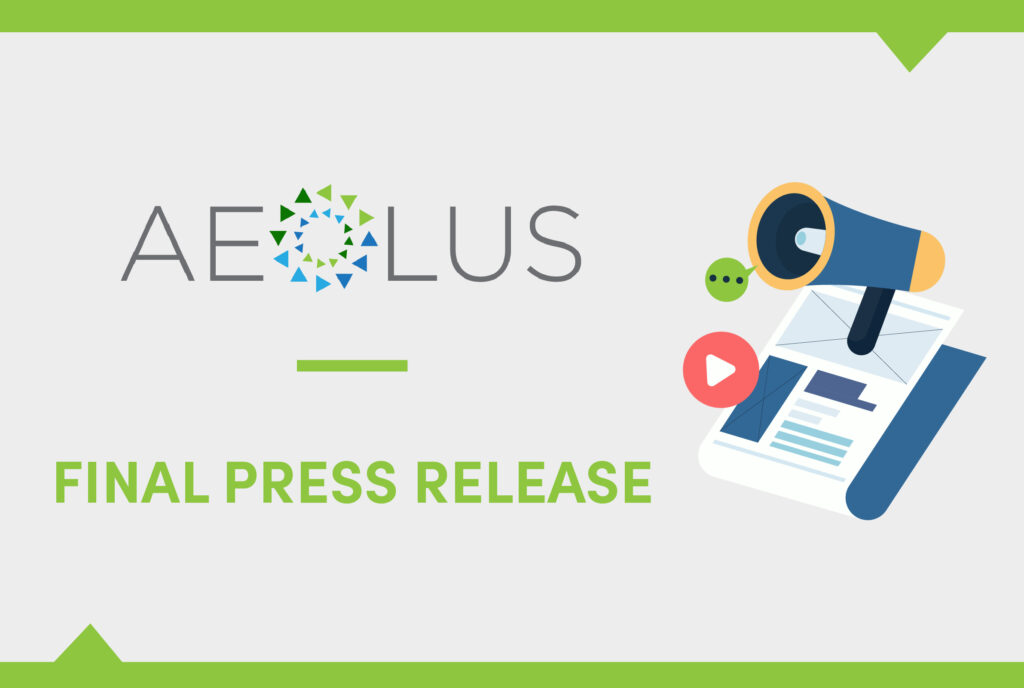After nearly four years of collaborative effort, the AEOLUS consortium is proud to announce the successful conclusion of the project. This EU-funded initiative, part of the Horizon 2020 program, brought together experts, organizations and institutions from across Europe to develop next-generation photonic gas sensors. By leveraging Photonic Integrated Circuits (PICs) and machine learning, AEOLUS introduced compact, cost-effective, and high-precision gas sensing solutions.
AEOLUS Achievements
The fabrication process for AEOLUS Photonic Integrated Circuits (PICs) was optimized to improve reliability, addressing graphene delamination issues through an enhanced encapsulation design. Key photonic components, including passive elements, thermal sources, photodetectors, and Ge components, were successfully fabricated and evaluated for performance, ensuring a stable and efficient sensing platform.
Key achievements include:
- Proof of concept validation of the AEOLUS approach
Using an integrated thermal source (Graphene) and suspended Si waveguides as sensing elements, we have managed to detect CO2 gas measurements. This approach, coupled with the achievements and proven components below (such as Graphene photodetectors, wafer scale capping lids etc.) allow for a fully integrated multi-gas sensing concept to be realised! Significantly lowering the cost and size of the photonic sensors (non-dispersive infra-red absorption type (NDIR).
- Graphene thermal source
The graphene thermal source has been validated, with coupling efficiencies of up to 70% into the suspended waveguides and stable for hours.
- Graphene photodetector
AEOLUS successfully fabricated graphene photodetectors with 400 nm Al₂O₃ encapsulation and split gates. Challenges with suspended waveguides were resolved, enabling graphene deposition on thermal sources.
- Si Passive components
AEOLUS fabricated passive components in two runs, refining waveguides, resonators, and grating couplers. The second run improved yield to 100%, with propagation losses of 1.5–3.4 dB/cm. The resonators allow to select specific wavelengths from the thermal emitter, thusly selecting the gas that each sensor can detect through the NDIR absortpion process.
- Ge Passive components
AEOLUS investigated and fabricated passive Ge elements using epitaxial growth on a Ge-on-Si platform. Two runs produced MMIs and grating couplers, with the second run improving stability after initial over etching issues, achieving a 64% confinement factor.
- Wafer scale capping lid (protective lid)
AEOLUS developed wafer-scale process to protect the suspended waveguides from debris but allow proper air flow to enable gas detection. These capping lids use Al-Au thermo-compression bonding (250°C, 29 kN) and they can be used to cap individual sensors.
- IoT Platform and Machine Learning
The AEOLUS IoT Platform, integrated with OTE’s LeonR&Do, uses AI/ML for predictive air quality monitoring. It supports various sensors, offers real-time analysis, alerts, and secure data visualization, and includes a WebGUI for real-time and predictive sensor data access.
- Dissemination and communication
The AEOLUS consortium has actively promoted its innovations through dissemination, exploitation, and communication efforts to maximize impact. Market analysis and business models are in progress, while outreach is maintained via social media, a project website, and high-impact journal publications. AEOLUS also joined ECREAM, fostering collaboration in environmental sensing, and contributed to Photonics21’s 2024 meeting, helping shape EU research priorities.
Impact of the AEOLUS Project
AEOLUS is developing a miniaturized, low-cost Photonic Integrated Circuit (PIC)-based gas sensor that integrates machine learning for smart IoT applications. It offers a smaller, more efficient alternative to traditional NDIR sensors through wafer-scale manufacturing and hybrid integration, reducing size and cost considerable while maintaining the reliability of photonic sensors over the electrochemical ones.
Key Applications:
✔ Safety alarms and safety switches based on gas sensors
✔ Outdoor air quality monitoring
✔ Indoor air quality
✔ Industrial applications
Beyond tech innovation, AEOLUS advances scientific research, sensor design, and machine learning for air quality, benefiting both industry and the European research community.
For more information, please contact:
Prof. Hercules Avramopoulos
hav@mail.ntua.gr
Dr. Dimitris Apostolopoulos
apostold@mail.ntua.gr
Dr. Harry Zervos
hzervos@mail.ntua.gr

